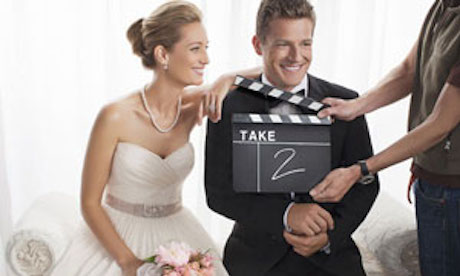Almost a third of all the marriages of New Zealand residents last year were remarriages.
Of the 19,237 marriages 13,312 were first marriages, 5825 involved one or both parties being previously married.
Last year, for every 1000 single people of a marriageable age, 22 got married. That’s less than a quarter of the 1971 peak rate of 91 per 1000.
On the other side of the register, divorce rates are in decline. Last year, 8279 couples split – a rate of 9.4 divorces for every 1000 estimated existing marriages.
The facts about marriage
- General marriage rates peaked in 1971 at 45.5 per 1000.
- Last year, men getting married for the first time had a median age of 30.1, and women 28.6. In 1971, it was 23 for men and 20.8 for women.
- Nearly half of all Kiwi babies are born out of wedlock. Last year, the number of babies born ex-nuptially was just 3000 less than those born to married couples (27,793 versus 30,924). In 1980 the difference was ten times greater.
- More than 200 same-sex marriages, which were legal from August last year, were not enough to stop the number of marriages dropping below 20,000 for the first time since 2001.
- Last year, 8279 couples split – a rate of 9.4 divorces for every 1000 estimated existing marriages.
- The divorce rate has been declining slowly every year from a peak of 12.8 dissolutions per 1000 marriages in 2003 and 2004, to 9.8 in 2011.
- Just over a third of couples who married in 1988 had divorced before their 25th wedding anniversary.
I believe people are choosing [to marry] so their status is absolutely recognised: they are husband, or wife, or spouse,” says Catriona Doyle, director of Family Law Specialists Wellington.
”It’s a bond on public record. And you can’t remarry overnight.” Couples must endure two years of ”separation” before they can divorce.
Despite her profession, Doyle believes in the value of marriage.
”There’s no way there could’ve been that furore last year about opening marriage to gay and lesbian couples without there being a fundamental belief it’s something special,” she says.
”I think it’s more valued both by people who get married, but also by friends and family. Anyone can end up in a de facto.”
“Not everyone can end up in a marriage relationship, you have to work hard to get it happening.” There’s the paperwork: as with dogs, firearms, and vehicles, marriage requires a licence. And of course, there’s the ceremony itself.
”It’s not the magic bullet. Relationships are hard, but I do think that for some people, marriage means more,” she says. ”Legally and socially. I think it’s a big deal.”
Source
